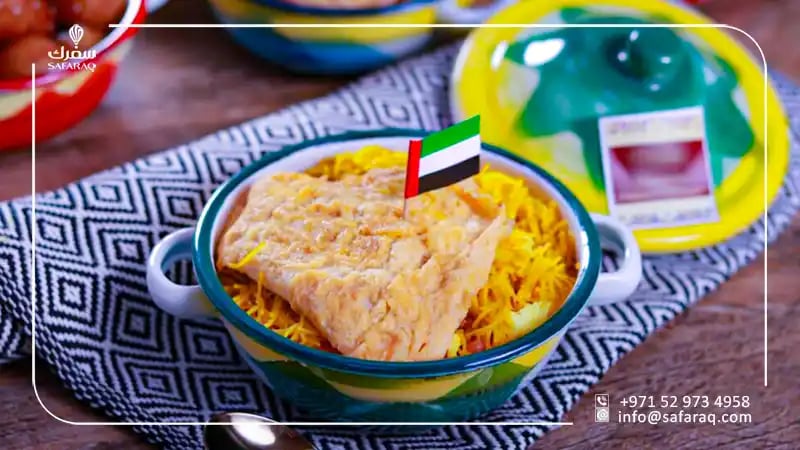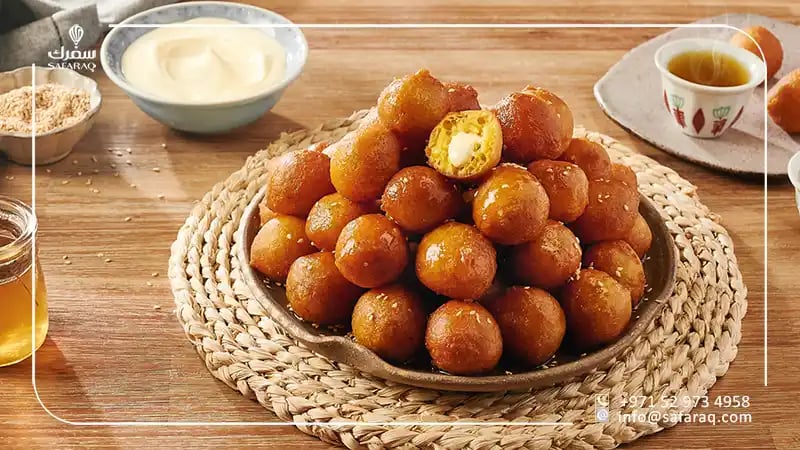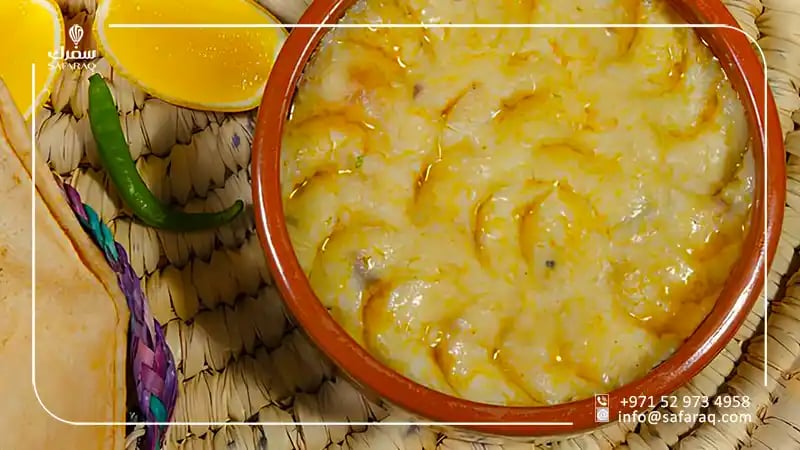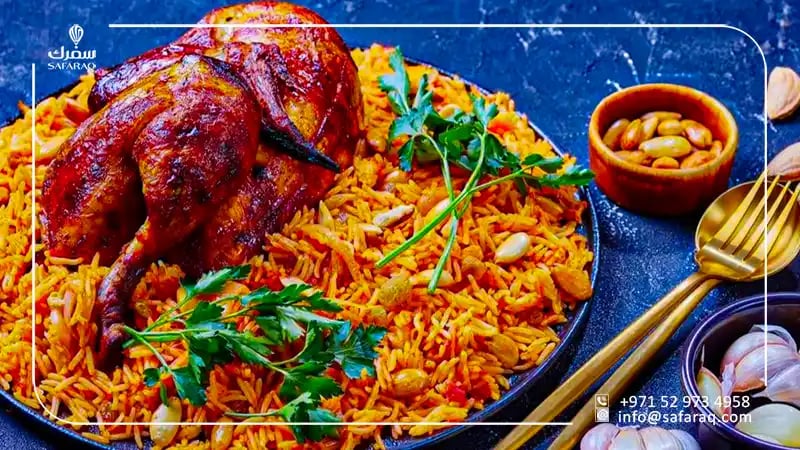Traditional Emirati Cuisine: An Authentic Guide

Traditional Emirati cuisine stands as a vibrant reflection of the nation's rich heritage and deep-rooted history. It blends authentic flavors with simple, yet delicious ingredients to craft delightful taste experiences. Emirati cuisine presents a unique variety that mirrors the culture of hospitality and generosity the UAE is renowned for. From celebrated dishes like Harees and Machboos to popular desserts like Luqaimat and Balaleet, explore with us a world of flavors that narrate ancestral tales and embody the spirit of authentic Emirati heritage.
An Overview of Emirati Cuisine and Its Origins
Emirati cuisine is an integral part of the country’s cultural heritage, reflecting the evolution of life in the UAE over the centuries. This cuisine has been shaped by the desert and coastal environment in which the ancestors lived, relying primarily on meat, fish, dates, and grains. Maritime trade also introduced various spices and flavors from India and Persia, adding a unique diversity to Emirati dishes.
Life in the UAE was based on simplicity, but this did not prevent the creation of delicious recipes using naturally available resources. This has earned Emirati cuisine a prominent place among Arab and Gulf cuisines. Today, Emiratis continue to uphold their food traditions, with traditional dishes still present in celebrations and gatherings. They have become an essential part of cultural identity, passed down from generation to generation.
Key Ingredients of Emirati Cuisine
Emirati cuisine relies on natural ingredients that reflect its desert and coastal environment, giving its dishes a distinctive character and rich flavors. Some of the most prominent ingredients include:
- Rice: A staple in many Emirati dishes such as machboos and biryani, cooked with spices and meats to create hearty and satisfying meals.
- Meat: Lamb and camel meat are commonly used in traditional dishes, cooked in various ways such as roasting or slow cooking with spices.
- Fish: A primary component of the diet in coastal regions, often grilled or fried with distinctive spices to enhance its flavor.
- Dates: A natural source of energy, used in desserts, drinks, and some main dishes, making them a key ingredient in Emirati cuisine.
- Dairy: Consumed daily in the form of laban and yogurt, sometimes flavored with cardamom and saffron, offering both health benefits and refreshment.
- Spices: A defining feature of Emirati cuisine, with saffron, turmeric, cardamom, and cinnamon widely used to add rich and distinctive flavors to dishes.
These ingredients work together to give Emirati cuisine its unique balance between simplicity and authenticity, reflecting the deep-rooted hospitality of the Emirati culture.

Most Popular Traditional Emirati Dishes
Emirati cuisine features a wide variety of traditional dishes that combine rich flavors with natural ingredients, reflecting a cultural legacy that has endured for centuries. Some of the most popular Emirati dishes include:
- Machboos: A rice dish cooked with meat or chicken, flavored with a blend of Emirati spices such as saffron, cardamom, and cinnamon. It is commonly served at family gatherings as a main course.
- Thareed: Made with traditional Emirati bread soaked in meat or chicken broth, along with vegetables and spices. This dish is especially popular during Ramadan due to its high nutritional value.
- Harees: Prepared by cooking crushed wheat with meat until it reaches a creamy texture, then served with butter or ghee. It is one of the oldest Emirati dishes, still enjoyed widely today.
- Luqaimat: Small fried dough balls dipped in date syrup or honey, making them a favorite dessert for special occasions and celebrations.
- Balaleet: A dish consisting of sweetened vermicelli mixed with cardamom and saffron, served with eggs to create a balance between sweet and savory flavors.
These dishes showcase the deep-rooted Emirati heritage and continue to be widely enjoyed by both locals and visitors from around the world.
Read: The Best Adventure Spots in Dubai for Thrill Seekers.

Traditional Emirati Beverages
Beverages hold a significant place in Emirati culture, representing the history of Arabian hospitality. Emirati beverages range from hot to refreshing drinks, making them an essential part of daily life.
- Arabic coffee: The beverage most closely associated with Emirati culture. It is made from roasted coffee beans infused with cardamom and saffron and served at social gatherings as a symbol of hospitality, often accompanied by dates to enhance the experience.
- Karak tea: Introduced into Emirati cuisine through Indian influence, this tea is brewed with black tea, milk, and sugar, along with cardamom and saffron, giving it a rich and distinctive flavor that is widely loved.
- Laban: A refreshing cold yogurt-based drink, especially consumed during the hot summer months for its cooling and hydrating benefits. It is a staple beverage in Emirati households and restaurants.
These traditional beverages reflect the Emirati spirit and continue to be prepared using traditional methods, maintaining their authentic taste and cultural significance.
Cultural Influence and Evolution of Emirati Cuisine
Emirati cuisine has undergone significant evolution with the country’s openness to the world and its exposure to international cuisines. While Emiratis remain committed to their culinary traditions, global influences have shaped some dishes, leading to modern adaptations while preserving the essence of Emirati flavors. For instance, some restaurants now offer healthier versions of traditional machboos or luqaimat with innovative flavors.
Tourism has played a significant role in introducing Emirati cuisine to the world, allowing visitors from diverse backgrounds to experience traditional dishes in fine dining settings. Additionally, food festivals and cultural events held in the UAE help promote Emirati cuisine, making it more accessible and well-known internationally. This evolution has not diminished the identity of Emirati cuisine but rather strengthened its presence as a cuisine that honors the past while embracing the present.

Explore the UAE on a Culinary Journey with Safaraq Tourism
A visit to the UAE is not complete without experiencing its traditional cuisine, which embodies hospitality and heritage. With Safaraq Tourism, you can embark on a culinary journey to discover the finest restaurants serving authentic Emirati dishes. From savoring harees in a traditional setting to enjoying Arabic coffee in a charming atmosphere, we will take you on a journey through time to experience unforgettable flavors.
Book now with Safaraq Tourism and get ready to explore the authentic flavors of the UAE on an unforgettable journey.
Featured tourist services
We offer top tourist services with the highest standards of quality and luxury with 24/7 follow-up.

Flight reservations

Tourist programs

Hotels and Resorts

Car Reservation

Group Tours

VIP Services
Subscribe To Our Newsletter
Find More About The Latest Safaraq






















 Home
Home




